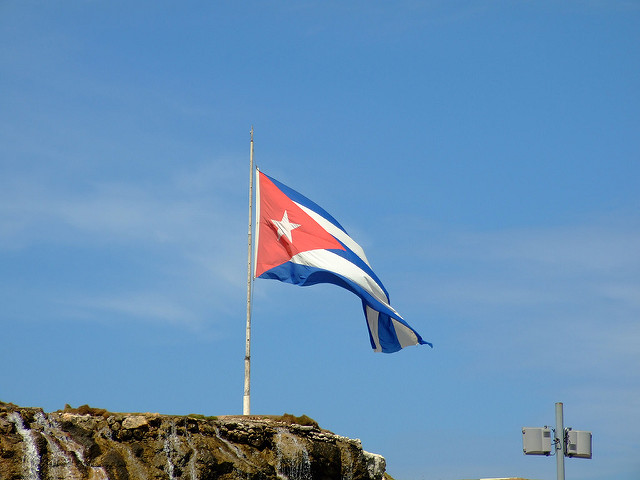News
Cuba struggling to keep professionals from leaving

But the project is part of a fragile experiment whose success or failure might help determine if Cuba is able to pull itself out of years of economic stagnation and brain drain. (Photo: Daniele Febei/ Flickr, CC BY-SA 2.0)
PINAR DEL RIO, Cuba — Calle Marti is a modest half-mile boulevard split by a simple winding flagstone path that’s bracketed by green grass, pine trees and curving blue cement benches.
But the project is part of a fragile experiment whose success or failure might help determine if Cuba is able to pull itself out of years of economic stagnation and brain drain.
The central avenue in the western city of Pinar del Rio, population 150,000, was redesigned over the last three years by a private firm of three 20- and 30-something architects hired by the communist provincial government — a contract that would have been unimaginable in Cuba just a few years ago.
Over the last decade, Cubans making state salaries of less than $25 a month have moved by the hundreds of thousands into the private sector — opening stores, restaurants and bed-and-breakfasts that have been among the few sources of growth for the island’s moribund centrally planned economy.
Graduates of Cuba’s renowned free universities have been mostly left out of private jobs in their fields, because the state sees the privatization of professions like architecture and accounting as unacceptable in Cuba’s socialist system. The government has argued that individuals shouldn’t profit, feeding inequality, from society’s costly investment in free education. Professionals looking for better lives have emigrated by the tens of thousands or turned to unskilled but higher-paying work like waiting tables or driving taxis.
The experience of Agora, the three-year-old boutique design firm in Pinar del Rio, offers a glimpse at an alternative future.
The three architects began Agora, a Greek word meaning public space, thinking they would work largely for private citizens renovating their homes as bed-and-breakfasts in Pinar and the town of Vinales, a major tourist attraction 30 miles away.
In 2014, however, the firm learned that the provincial government was asking state-run engineering firms to bid on renovating the median strip of Calle Marti.
Agora bid for the design of the project and won, convincing officials it could do the work quickly and more efficiently. State workers are now finishing the project, and today thousands of Pinarenos a week stroll and sit in the shade along the newly rebuilt avenue.
“We really appreciate the open minds of those in the government who realized they needed help from people,” said Yasser Jimenez, 36, who founded the firm with Oriesky Bencomo, 37, and Jose Luis Valdes, 27.
All three were born and raised in Pinar but graduated from the prestigious architecture program at Jose Antonio Echeverria University in Havana. All three took state jobs in architecture and design before founding Agora in 2014.
Agora isn’t officially an architecture firm — the government doesn’t yet permit that. Jimenez, Bencomo and Valdes are individually registered as self-employed decorators and artisans.
That leaves them and others like them legally unprotected and vulnerable to the whims of bureaucrats. A highly successful 200-member co-operative that provided accounting and auditing services to state and private businesses was closed by the government this month because it had violated “its social purpose,” according to state officials who provided no further explication.
Private business people in all sectors are equally exposed. The government this month froze all new private business licenses until further notice, saying in vaguely worded statements that it would be “reordering” and “perfecting” the permit system.
Young professionals such as Agora’s founders are watching carefully to see if Cuba becomes a place where people like them can flourish.
“We’re young people who’ve decided to stay, to live here, and really we’d like to do more,” said Jimenez. “All types of projects, provide engineering services, build a building from zero.”
Government figures showed that the number of Cubans working in 200 permitted categories of private employment rose from 140,000 in 2009 to 535,000 in 2016. Some 400 worker-owned and run co-operatives are currently operating in non-agricultural fields like construction or recycling.
Cuba opened to private business because the state firms that control most of the economy are widely acknowledged to be inefficient and slow and plagued by poor workmanship and pilferage. But the success of the private sector has come to be seen as a threat by government officials who are both competing with it and have the power to regulate it.
Pavel Vidal, a Cuban economist who emigrated to work as a professer at Javeriana University in Cali, Colombia, said he believes private sector employment grew 7 per cent in 2016 even as the national economy shrank 0.9 per cent, throwing the country into recession.
Vidal said Cuba’s reluctance to legalize skilled private labour is driving a brain drain to other countries and pushes professionals from low-paying state job to higher-paying unskilled labour.
“It doesn’t make sense to invest billions in education and then send its graduates to a sector of low added-value.”
Irina Garcia graduated from the University of Havana’s law school in 2009 and left a job with the state prosecutor’s office to be a lawyer for a group that works with the Catholic Church to train entrepreneurs.
She said the state was mistakenly focusing on limiting private-sector work instead of making government jobs more appealing.
“When professionals really feel motivated, not all of them are going to leave for the private sector,” she said. “Not all of them have the inclination, the capital, or the daring. They prefer stability.”
While some in her field are hopeful that the state will accelerate its opening to more private professional business, she said she wasn’t optimistic.
“It’s been working a certain way for years and these transitions are slow,” she said. “I don’t see it in the immediate future, but I hope I’m wrong.”





















